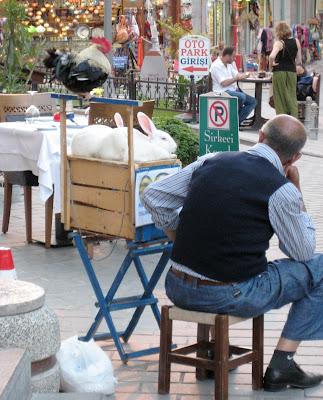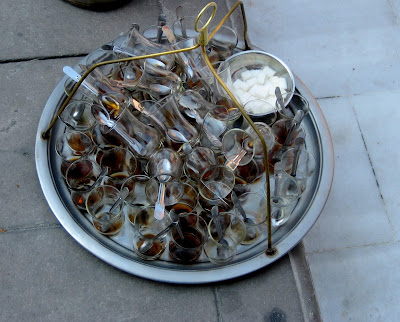 |
| Istanbul: Pierre Loti Hill |
TLG colleague,
Mariani, is in Istanbul for a month for a
CELTA course. Another colleague,
Hannah (from Missouri, by the way), stopped by to visit on her way back to the U.S.
Going up
We got together on a Saturday evening and made our sweaty way up to Pierre Loti Hill, the terminus of one of Istanbul's funiculars. Didn't get good instruction from the info office next to the Istanbul Gar, so instead of taking a ferry up the Golden Horn to the Eyup Mosque complex (because the ferry had finished for the day), we boarded a crowded bus, then walked around the Mosque area to stand in line for 45 minutes to take the cable car (funicular) up the hillside (all in the interest of the experience, yes?)
 |
| Istanbul: Pierre Loti Hill |
Note: If you're only going to be in Istanbul for a few days, try to avoid coming on Saturday and Sunday. The weekends are crowded with both domestic and international tourists. In a city of 13 million, that's a lotta domestic tourists.
 |
| Istanbul: Pierre Loti Hill |
The view of Istanbul, laid out below the hill, is impressive. We had some drinks at the Pierre Loti cafe, then moved on up the winding cobblestone path around the cafe toward the summit. Lo, there are a number of cafes with beautiful views.
There is an old cemetery that hugs the hillside and it's pretty to look down at Istanbul and its curving waterway from the perspective of the white gravestones.
 |
| Istanbul: Pierre Loti Hill |
We stopped briefly at a neighborhood party featuring girls and women dancing. Several adolescent boys wore red, silk-like capes with white stars and crescents. Significance unknown. I asked Mustafa, my hotel host, if he knew. Nope.
Going down
Time to make our way down the hill. We had several options and we chose a side street that seemed more or less headed in the right direction, i.e. down.
 |
| Istanbul: Pierre Loti Hill |
Because both Mariani and Hannah are from TLG's Group 22 (I'm from 21), and because this group enjoys some notoriety for its we'll-laugh-later misadventures, the odds were good this choice would result in some sort of adventure.
On the way down the hill, we made a couple of directional choices, each designed to carry us closer to the water below. In one very narrow lane on a steep incline, we saw an elderly woman looking out her window, a man coming up, a man going down. Hannah, I, and Mariana were strung out a bit in a line, in that order.
 |
| Istanbul: Pierre Loti Hill |
We came upon a deep staircase, meaning it plunged down a long way, it was steep, and the steps were rather high. There was an iron-pipe banister on the right; a wall alongside the left. One of the men who'd passed us, with a purple shirt, was inexplicably stalled on one of the steps, looking meditatively out toward the picturesque vista, desultorily picking at his nose.
I wondered momentarily what he was doing there, but passed him by as I continued my way down the stairs. Hannah had preceded me.
The scream
All of a sudden - Mariana screamed! A healthy, high-pitched scream!
My first thought - she was falling down the steep staircase and I grabbed on to the banister firmly to break both our falls.
My second thought - that purple-shirted guy had stolen her bag! Because as I turned to face Mariani, I saw him running up the steps away from us!
It was neither of those things.
The purple-shirt guy had reached under Mariana's ass and given it a firm and thorough grope. And then ran like the wind.
Once the shock was over, we laughed. The jerk.
A good lesson
The thing is that all three of us noted the purple-shirt guy just standing there on the steps. All three of us thought it was a little odd. All three of us are smart women.
And all three of us failed to take any action based on that perception of oddness, such as calling out to the others to stay alert because of the guy, or to stop and wait for the guy to move down or upward, putting
him on alert that he'd been caught out for something, giving him the eyeball all the while passing him to, again, let him know he'd been caught out. Or taking his photo before passing him.
Maybe because there were three of us, we were lulled into a false sense of security.
... and then we missed the bus
As the sun completed its setting business, we walked along a waterside park. We sat for awhile on a bench. We wound our way back through the Eyup Mosque complex, passing by gravestones beautifully lit. Had a relaxing dinner.
 |
| Istanbul: Eyup Mosque |
Who knew the buses in the Eyup neighborhood stopped running by 11:30? We didn't, so after some confusing conversations with various people, we took a taxi to Emininou, where I could hop a tram back to my place and Mariani and Hannah could take one to their neighborhood near Taksim.
 |
| Istanbul: Eyup Mosque |









































